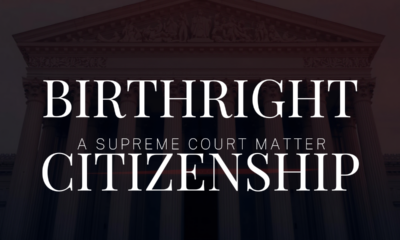Entertainment Today
Human replacement part 2 – writers and actors
The human replacement paradigm now extends to writers and actors in motion pictures and on TV, unless audiences refuse to watch.
The human replacement paradigm has gone beyond fully automatic fast-food dispensaries. (Restaurant scarcely applies to an establishment that rushes its orders even faster than a high-school cafeteria.) It now extends to the motion-picture and television industries, though few in their audiences realize it, or what it means. Nevertheless, it has shut down those industries, as writers and actors, fearing for their jobs, have gone on strike. As the Writers’ and Screen Actors’ Guilds continue their standoff with “The Alliance,” we in the audience should also reflect. In point of fact, we could be next, and talent alone will afford no protection against the prospect.
Human replacement – the hidden issue of the double strike
For those of you who have seen only one motion picture in the last three or four months, that being The Sound of Freedom: two major guilds have now shut down nearly all production on new motion-picture and television projects. That is what strikes do. The two guilds are the Writers’ Guild of America and the great combined actors’ guild called SAG-AFTRA. (That stands for Screen Actors’ Guild and American Federation of Television and Radio Artists.) These two can’t “pick off” studios, because they all have formed a single trade group. That groups is the Alliance of Motion Picture and Television Producers, called AMPTP or more simply “The Alliance.”
As of May 1, 2023 (a day with lots of socialistic tradition behind it), the Writers’ Guild of America (WGA) is on strike. Here is a list of their demands and the latest Alliance counteroffers:
The “issues” in the WGA strike appear to revolve around pay. But the concerns are more serious. As complex – and changing – as the pay issue is, it pales in comparison to another, deeper concern. Which is: ChatGPT and similar artificial intelligence programs could write as well as, or better than, some WGA members.
The AI threat
The Alliance knows it, and its member studios want to take full advantage of it. But the Guild knows it, too. Indeed the curse of the craft- and trade-union movements is that they exist to serve the interests of the mediocre. The top talents blithely assume that ChatGPT and similar engines could never replace them. But apart from the mediocre being the majority, and having the controlling votes, even the top talents should probably worry. Already college professors worry about their students handing in term papers that ChatGPT wrote for them. Worse, Chat GPT is already producing commercially valuable copy, and even short dramatic scripts. From that to full shooting or stage scripts is only a matter of time.
The Guild likely brought some of this on themselves. By tradition, one sale makes a writer a professional. So say both the Alliance and the Guild. And what does it take to become a professional? Merely to land that first sale – by accepting a challenge to produce a script purely on speculation, delivering it on time, then closing the sale. But that creates “instant tenure.” And the Guild makes no attempt to screen its members for talent. For that reason, mediocre writers entered the Guild – and stayed. And the Guild coddles them, because they pay dues.
The curse of mediocrity
Mediocre writers have been the curse of both industries for years. The worst instance of this curse happened in January of 1966. ABC Television had saddled itself with the worst schedule of all the Big Three. It was so bad that ABC replaced most of those series – mid-season. A network might replace one or two – but ABC replaced so many that they called it “The Second Season.” The ploy worked – but that does not alter their having gotten themselves into that fix to begin with.
Even apart from that debacle, every “nerd” probably heard parents, relatives, and schoolmates scoff, “I could sit here and write every one of those scripts!” That’s also why mid-season replacements still happened, though never again so many as in ABC’s “Second Season.” It is also why likely half of all series barely last a season, and then the network cancels them.
The motion-picture industry has the same problem, and lately it’s gotten worse. 2023 so far has been the worst movie season on record. Studios spend hundreds of millions of dollars to make a film – and then the film barely grosses more than the production budget. And with exhibitors taking their cut (usually half), the studio loses money.
Small wonder, then, that some in “upper management” would love to replace most writers. Again, this is not about top talents, but about mediocre writers who nevertheless pay the dues. And about hacks willing to write “woke stuff” for executives with an agenda.
The actors must worry, too
Actors have the same problem, and some of the same dynamics. An actor will take a hundred or so “background roles” to pay the bills, until someone recognizes their “star quality.” (That is, if they have any.) These are not the extras – totally nondescript members of crowds, or nondescript soldiers. A background role might have one or two lines, or one often memorable scene. (Tim Considine having George C. Scott slap him in the movie Patton (1970) is the standout example. But the other patients in the hospital tent, and the doctors and nurses present, also were background actors.)
But now we have Computer Generated Imagery (CGI). Special-effects departments typically use this technique to avoid having to stage a real tank battle, for example. The problem is that CGI can replace actors as well as inanimate objects like tanks. Scan the actor, pay them for one day, then use the scan forever.
And studios have done it. In the last season of The Sopranos, the actress who played Tony Soprano’s mother was already dead. Yet she appeared. How? CGI. And after Carrie Fisher died in mid-production of Star Wars IX, Lucasfilm used CGI to insert scenes they still needed to shoot.
Every actor – even a top talent like Tom Cruise – knows that the studios could replace him in a trice. An actor’s job requires him to submit to photography – and voice recording. With so much footage available, mocking him up as a CGI replacement would be ridiculously easy.
How desirable is human replacement?
Very. No doubt if The Alliance could get away with it, they would replace every actor. In fact, Hollywood has made two movies already exploring human replacement in two different areas – one of them close to their work. In 1975 came The Stepford Wives, with Katherine Ross and Paula Prentiss. A “Men’s Association,” and its leader, “Diz” (Peter Lawford), has developed a technique for replacing a wife – with a robot. (The nickname “Diz” refers to the man’s previous work building animatronic robots for Disney parks.) They trick the woman into recording a set of words that would have all the required consonant and vowel sounds. And of course they take photographs – surreptitiously, of course. Then one night the husband takes the wife away for the weekend. She doesn’t come back – and a robot takes her place.
Then in 1981 came the close-to-home movie for the studios: Looker. A plastic surgeon (Albert Finney) sees several attractive women who ask for cosmetic surgery – and bring in lists of exact specifications. The women involved then go on photo shoots that apparently are fruitless. Soon the studio takes a whole-body wraparound video of each woman. That’s the last thing they ever do – because someone pays each a visit and throws her out the window. But the viewing public sees these women – in commercials. All are CGI images, with AI to direct their movements exactly.
The issue in the strike
CNAV will not vouch that Fran Drescher, now the president of SAG-AFTRA, ever saw either film. (Katherine Ross and Susan Dey, the female leads in Stepford and Looker, respectively, are both retired.) But she clearly knows what actors are facing. Obviously no one is suggesting that anyone is planning to murder them. But maybe they’re planning to recreate them with AI-powered CGI – and pay them nothing. So naturally she’s asking for no-automation clauses in contracts, or at least some kind of compensation for CGI replacement. But perhaps SAG-AFTRA should thank their lucky stars that The Alliance still has enough scruples. Otherwise, the Looker scenario, or Stepford Studios, becomes real.
Audiences have two reasons to worry. First, entertainment will be even less entertaining than it already is. The only movies available will feature AI-powered CGI actors acting out an AI-written script. Nothing will be even remotely real. And second – the human replacement techniques The Alliance clearly would love to use, are applicable in other industries. ChatGPT could automate away 300 million jobs.
What militates against that kind of human replacement?
The facile answer is the double strike, and the FTC investigating ChatGPT and seeking to shut it down. But the better answer is that ChatGPT is basically a hack writer with a one-track mind – and a “woke” mind at that. It produces either “woke” content or a vicious, heavy-handed parody of conservative content – depending on the prompt. (Andrew Torba, builder of the Gab Empire, is trying to train an AI engine of his own.)
On the screen, the AI-powered CGI background actor will deliver an even more wooden performance than we usually see in the movies today. Top talents – the stars – deliver background performances that attract notice. So the top talents should know that they’ll lose opportunities if they let The Alliance replace even the background actors with AI.
Better yet, audiences must demand real writers and real actors. They should insist on truth-in-labeling for all releases, so that they may know ahead of time whether a project is written by ChatGPT, or “stars” a bunch of CGI actors. (For that matter, what the Academies of Motion Picture and Television Arts and Sciences are going to do about this matter, begs explanation. AI will kill the Oscars and the Emmys – and with AI-powered animatronics, it will kill the Tonys too.)
So far, The Alliance doesn’t dare turn ChatGPT or AI-powered CGI loose, because they know the output will be trash. But audiences must act now before human and AI become indistinguishable.
Terry A. Hurlbut has been a student of politics, philosophy, and science for more than 35 years. He is a graduate of Yale College and has served as a physician-level laboratory administrator in a 250-bed community hospital. He also is a serious student of the Bible, is conversant in its two primary original languages, and has followed the creation-science movement closely since 1993.
-

 Accountability3 days ago
Accountability3 days agoWaste of the Day: Principal Bought Lobster with School Funds
-

 Constitution2 days ago
Constitution2 days agoTrump, Canada, and the Constitutional Problem Beneath the Bridge
-

 Executive1 day ago
Executive1 day agoHow Relaxed COVID-Era Rules Fueled Minnesota’s Biggest Scam
-

 Civilization3 hours ago
Civilization3 hours agoWhy Europe Shouldn’t Be Upset at Trump’s Venezuelan Actions
-

 Civilization1 day ago
Civilization1 day agoThe End of Purple States and Competitive Districts
-

 Civilization5 days ago
Civilization5 days agoThe devil is in the details
-

 Civilization4 days ago
Civilization4 days agoThe Conundrum of President Donald J. Trump
-

 Executive4 days ago
Executive4 days agoTwo New Books Bash Covid Failures














